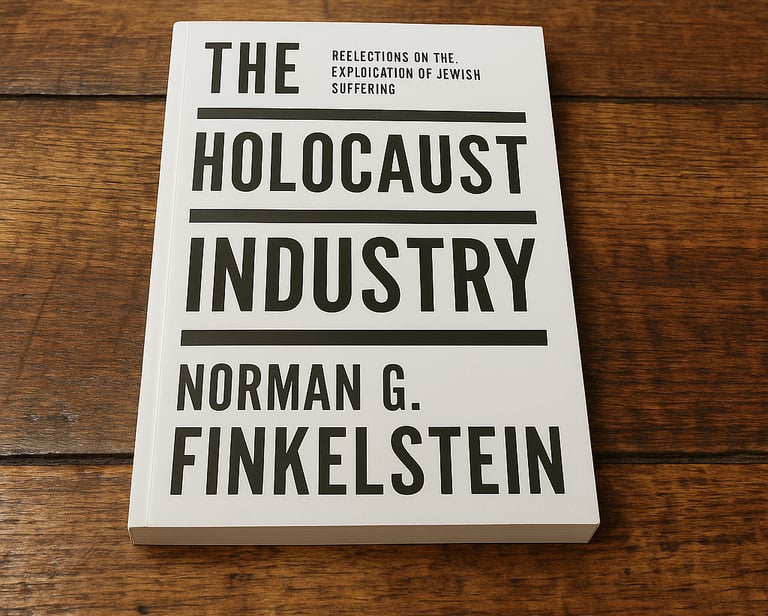Bölüm 1: Endüstrinin Ortaya Çıkışı ve Mali Boyutları
Dr. Norman Finkelstein'ın "Holokost Endüstrisi: Yahudi Acılarının Sömürülmesi Üzerine Yansımalar" adlı eseri, Holokost anısının, kendi görüşüne göre, belirli Amerikalı Yahudi kuruluşları ve elitleri tarafından mali ve siyasi kazanç için bir araca nasıl dönüştürüldüğüne dair eleştirel bir analiz sunar. Kendisi de Holokost'tan kurtulanların oğlu olan Finkelstein, amacının bu olayın kutsallığını haksız istismara karşı savunmak olduğunu vurgular.
1. Giriş: Sessizlik, Ardından Patlama
Finkelstein, II. Dünya Savaşı'ndan hemen sonra Holokost'un Amerikan kamuoyunda, hatta Yahudi toplumu içinde bile önemli bir yer işgal etmediğini belirterek başlar. Holokost'un Yahudi kimliğinde ve Amerikan siyasetinde merkezi bir olgu olarak "keşfedilmesi" ve yüceltilmesinin, büyük ölçüde İsrail'in 1967'deki Altı Gün Savaşı'ndaki zaferinden sonra gerçekleştiğini savunur. Bu zafer, İsrail'in ve onu destekleyen lobilerin ABD'deki artan gücü ve etkisiyle birleşerek, Finkelstein'ın "Holokost Endüstrisi" olarak adlandırdığı olgunun ortaya çıkmasına zemin hazırlamıştır.
2. Çifte Haraç: Tazminat Dosyası
Kitabın önemli bir bölümü, başta Almanya ve İsviçre olmak üzere Avrupa ülkelerinden ve özel şirketlerden talep edilen tazminat kampanyalarının ayrıntılı ve eleştirel bir incelemesine ayrılmıştır. Finkelstein bu süreci "çifte haraç" olarak nitelendirir.
Avrupa'dan Alınan İlk Haraç: Amerikalı Yahudi kuruluşlarının, yoğun siyasi ve ahlaki baskı yoluyla Avrupa ülkelerini ve şirketlerini devasa meblağlar ödemeye zorladığını iddia eder. Finkelstein, bu süreçte ihtiyaç sahibi gerçek kurtulanların sayısının ve uğranılan zararın boyutunun abartıldığını öne sürer. Bu konuda özellikle Almanya'ya Karşı Yahudi Maddi Talepler Konferansı (Claims Conference) ve Dünya Yahudi Kongresi (WJC) gibi kuruluşların eylemlerini eleştirir.
Kurtulanlardan Alınan İkinci Haraç: Finkelstein'ın iddiasının daha tartışmalı olan kısmı, elde edilen fonların önemli bir bölümünün ihtiyaç sahibi gerçek kurtulanlara asla ulaşmadığıdır. Bu kuruluşları kötü yönetim, şeffaflık eksikliği ve bu paranın büyük bir kısmını fahiş idari masraflara, kendi kültürel ve eğitim projelerine harcamakla veya siyasi nüfuzlarını güçlendirmek için kullanmakla suçlar. Ona göre, yoksul ve kimsesiz kurtulanlar bu "endüstrinin" asıl kurbanlarıdır.
3. İsviçre Bankaları Olayı: Sömürünün Zirvesi
Finkelstein, İsviçre bankalarındaki atıl Yahudi banka hesapları davasını incelemek için önemli bir bölüm ayırır. Bu olayda Yahudi kuruluşlarının, suni bir kriz yaratarak ve agresif taktikler kullanarak, İsviçre bankalarını Holokost kurbanlarına gerçekte borçlu olunanın çok üzerinde meblağlar ödemeye zorladığına inanır. Bloke edilen varlıkların boyutuna ilişkin birçok iddianın asılsız veya abartılı olduğunu ve asıl amacın hesap sahipleri için adalet sağlamaktan çok, ilgili kuruluşların mali kazançlarını en üst düzeye çıkarmak olduğunu iddia eder. Bu davayı, eylem halindeki "Holokost Endüstrisi"nin en belirgin örneği olarak görür.
Bölüm 2: İdeolojik Boyutlar ve Şahsiyetlerin Eleştirisi
4. İdeoloji Olarak Holokost: İsrail İçin Dokunulmazlık
Finkelstein, mali yönlerin ötesinde, "Holokost Endüstrisi"nin ideolojik boyutlarına da dalar. Bu endüstrinin, Holokost'u belirli işlevleri olan bir "ideolojiye" dönüştürdüğünü savunur:
Holokost'un "Benzersizliğini" Tesis Etmek: Holokost'un "benzersizliği" üzerine yapılan aşırı vurguya karşı çıkar; çünkü bunun Yahudilere ve özellikle İsrail Devleti'ne, onları eleştiriden muaf kılan ebedi ve özel bir kurban statüsü bahşettiğine inanır. Bu vurgunun bazen diğer soykırımları ve insani trajedileri ikinci plana attığını belirtir.
İsrail İçin Bir Kalkan: Finkelstein'a göre, bu ideolojinin temel işlevlerinden biri, İsrail'i politikaları, özellikle de Filistinlilere yönelik politikaları hakkındaki eleştirilerden korumaktır. "Holokost Endüstrisi"nin, İsrail'e yönelik her türlü ciddi eleştiriyi "antisemitizm" veya "Holokost inkârı" olarak yaftalayarak etkisiz hale getirdiğini iddia eder. Bunun, İsrail'in eylemlerine hesap vermeden devam etmesine olanak tanıdığını savunur.
ABD Desteğini Sağlamak: Bu ideoloji aynı zamanda, Holokost'un Yahudi devletine koşulsuz desteğin ahlaki bir gerekçesi olarak sunulmasıyla, Amerika Birleşik Devletleri'nden İsrail için siyasi, askeri ve mali destek sağlanmasına yardımcı olur.
5. Elie Wiesel ve Diğerlerinin Eleştirisi: Anıyı Çarpıtmak
Finkelstein, kitabında, "Holokost Endüstrisi"nin oluşumunda ve sürdürülmesinde rol oynadığına inandığı önde gelen şahsiyetleri sert bir şekilde eleştirir.
Elie Wiesel: En sert eleştirilerini yazar, Holokost kurtulanı ve Nobel Barış Ödülü sahibi Elie Wiesel'e yöneltir. Finkelstein, Wiesel'i Holokost anısını "duygusallaştırıp bayağılaştırmakla", tarihsel olarak yanlış veya abartılı anlatılar sunmakla ve ahlaki otoritesini İsrail politikalarını eleştirmeden savunmak için kullanmakla suçlar. Wiesel'in bu "endüstrinin" bir sembolü haline geldiğine inanır.
Diğer Kuruluşlar ve Kişiler: Finkelstein ayrıca bu sürece katıldığına inandığı diğer yazarların, tarihçilerin ve kuruluşların isimlerini vererek eylemlerini sorgular.
6. Holokost'un Unutulan Dersleri
Finkelstein, kitabını "Holokost Endüstrisi"nin bu trajedinin gerçek ve evrensel derslerini çarpıttığını savunarak bitirir. Annesinin (kendisi de bir kurtulan) öğretilerinden esinlenerek, Holokost'un ana mesajının, grup çıkarları için araçsallaştırılması veya başkalarına yönelik baskıyı meşrulaştırmak değil, dünya çapındaki tüm baskı ve adaletsizlik kurbanlarıyla dayanışma olması gerektiğine inanır. Holokost anısını, kendi görüşüne göre onu kötüye kullananların elinden geri kazanma çağrısı yapar.
Finkelstein'ın Sonuç Perspektifi:
Özünde Finkelstein, "Holokost Endüstrisi"nde, örgütlü bir Amerikalı Yahudi elit grubunun, Holokost'taki Yahudi acılarını abartarak, çarpıtarak ve sömürerek önemli mali faydalar sağlamayı ve İsrail politikalarını meşrulaştırıp eleştirmenlerini bastırmak için güçlü bir ideolojik kalkan yaratmayı başardığını savunur. Bu olguyu, kurbanların gerçek anısına ve Holokost'un evrensel derslerine bir ihanet olarak görmektedir.

